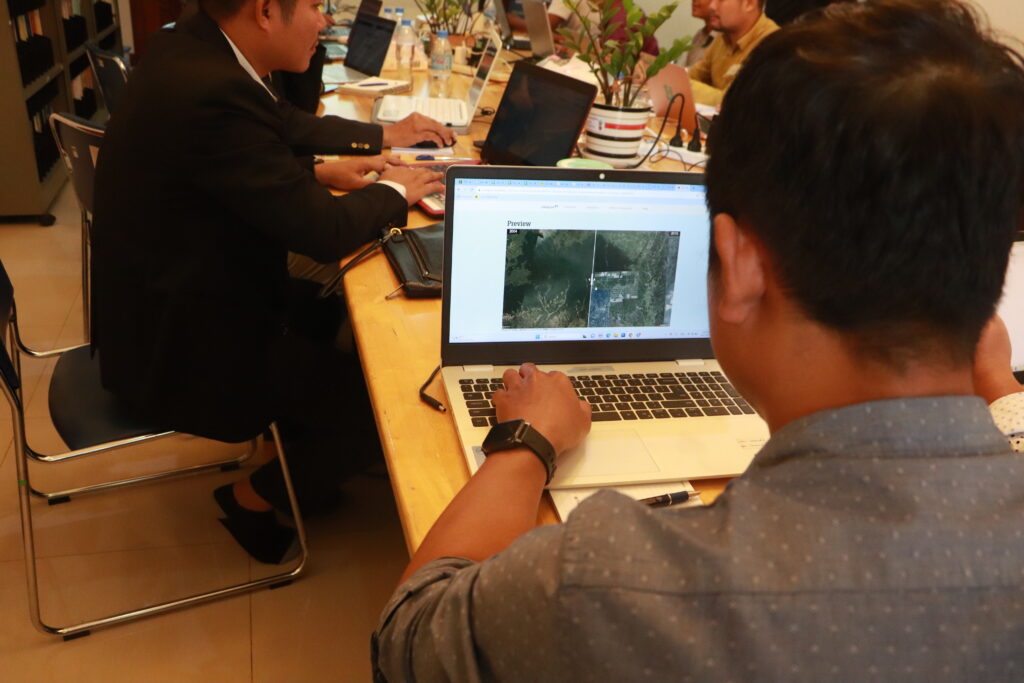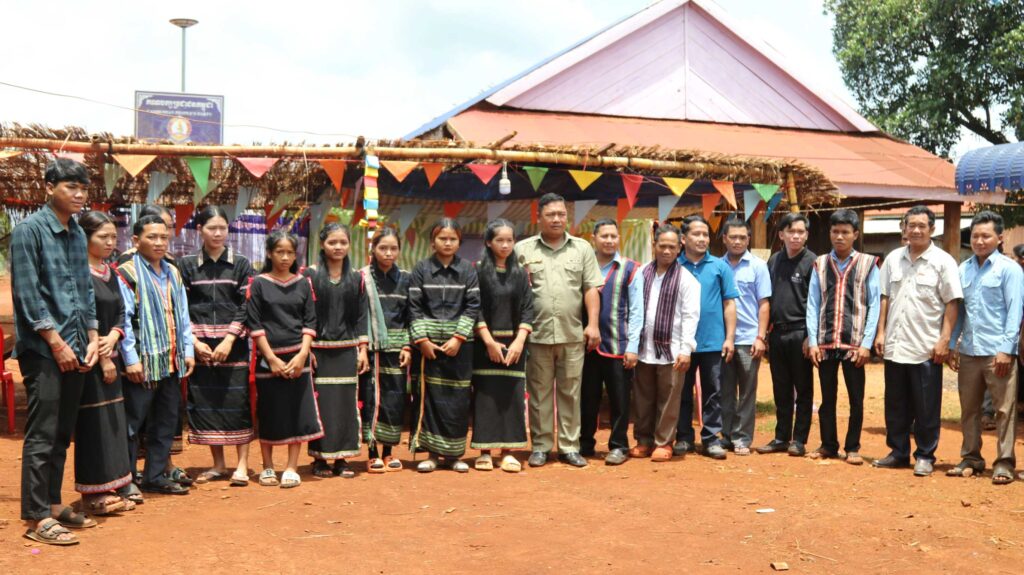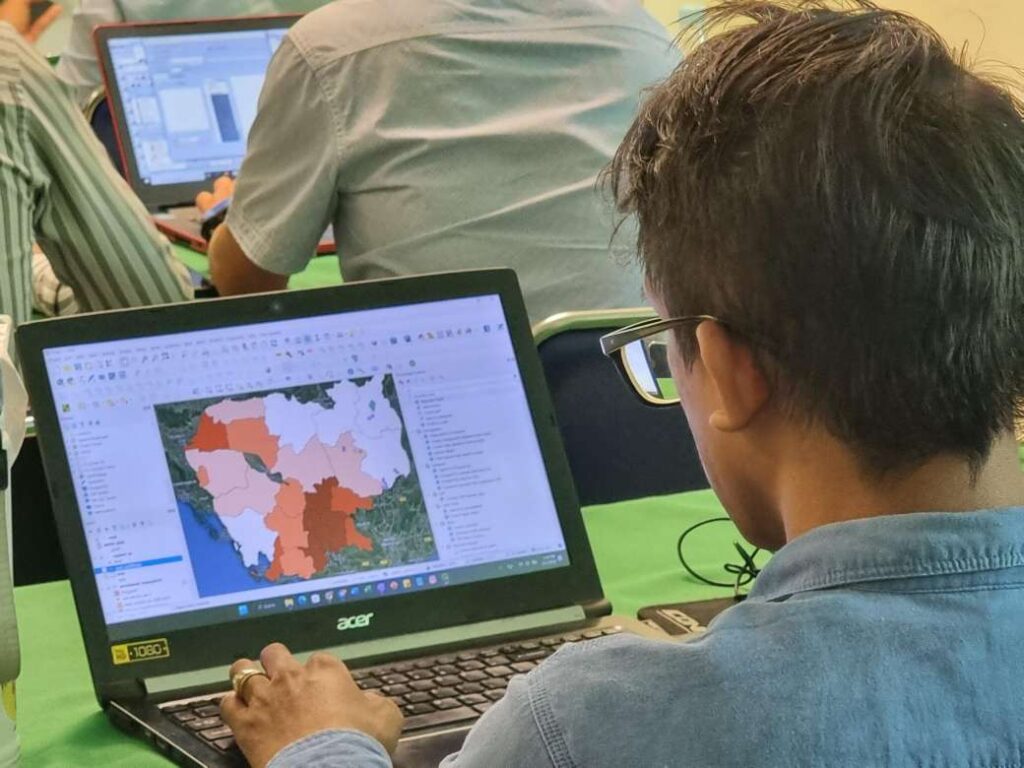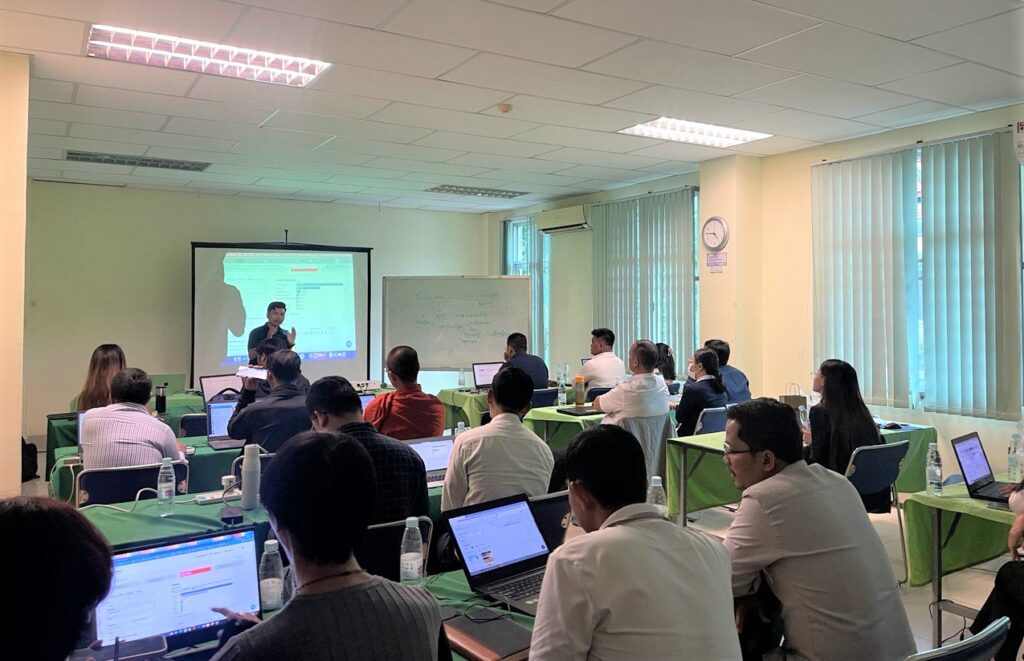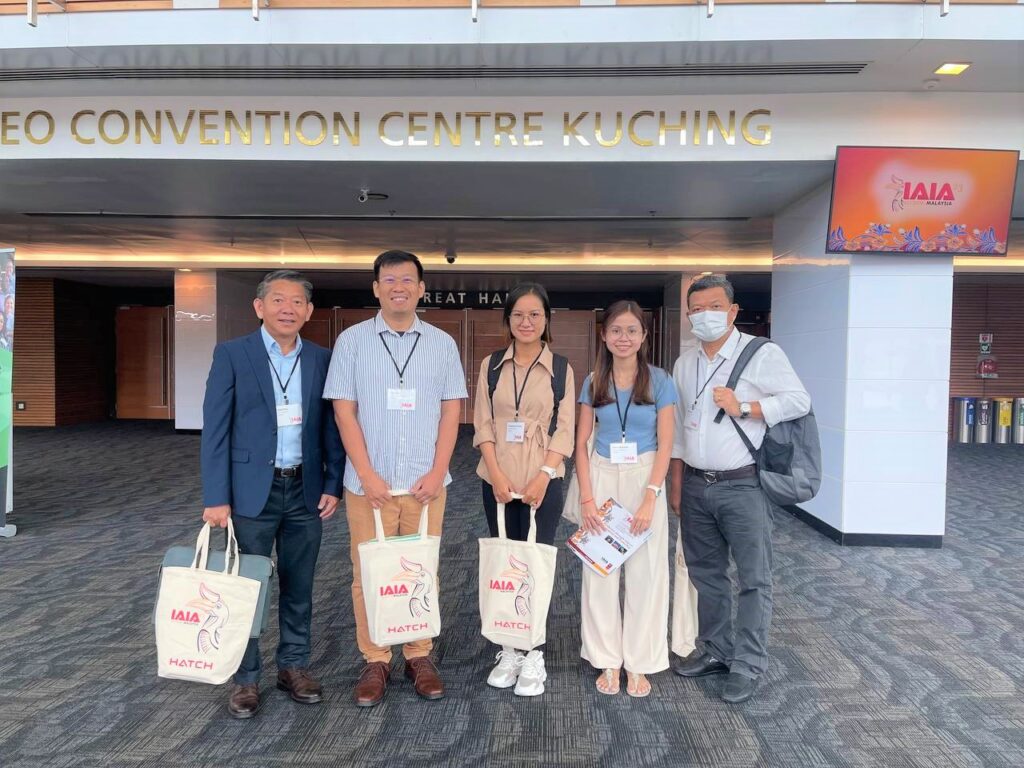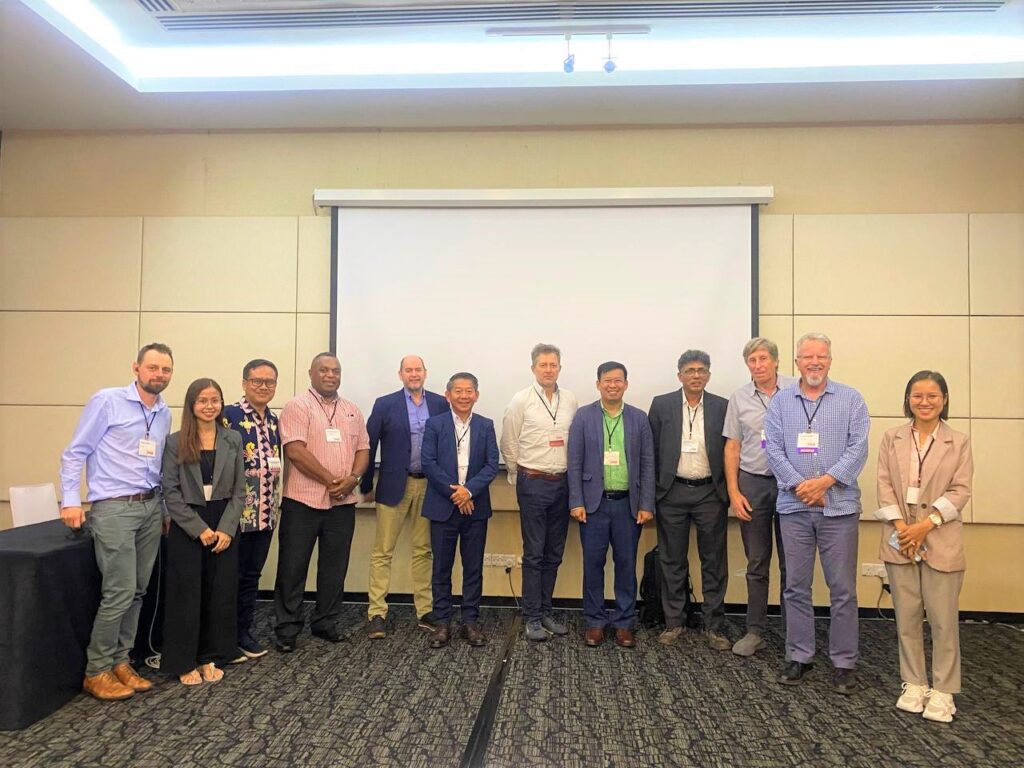Blogs
Data visualization training in journalism
On September 11th, 2023, Open Development Cambodia (ODC) conducted an enriching training session titled \"Data visualization in journalism,\" attended by a group of 14 journalists (2 females) from various locations such as Phnom Penh, Kratie, Siem Reap, Battambang, Stung Treng, and Mondulkiri. With our \"Data visualization in journalism\" training, the trainees can embark on a transformative journalistic journey that explores the intersection of data and narrative. Data visualization, the art of transforming raw data into compelling visuals, is more than a skill; it\'s a narrative accelerator. In an age when information bombards our senses, journalists with data visualization skills gain the ability to change complex datasets, transforming them into impactful graphs, interactive charts, and dynamic maps that bring stories to life. This course provides an opportunity to seamlessly combine journalistic skills with data-driven precision, unleashing the potential of visual storytelling to captivate, inform, and inspire. The training aims to equip journalists with the skills to integrate visual elements into their storytelling, enabling them to convey information, engage audiences, and unveil deeper narratives through impactful and accessible graphics. The primary objective of this training initiative is to equip journalists with the proficiency to incorporate visual elements into their narratives. By doing so, they acquire the ability to convey information effectively, engage their audiences, and unveil deeper layers of the narrative through compelling and easily comprehensible graphics. The comprehensive training program explored data comprehension, the principles of data interpretation, the art of chart design, and an introduction to the powerful data visualization tool, Datawrapper. Despite the constraints of time, the participating journalists displayed remarkable adaptability and tenacity, successfully producing visualizations and integrating them into their stories. These hardworking trainees exhibited a worthy commitment to learning this new tool and the concepts surrounding it. Their dedication resulted in the creation of 14 interactive visualizations, each addressing a diverse selection of topics using Datawrapper. While it is acknowledged that their efforts may not yet be considered professional, it is evident that they have acquired a fundamental understanding of how to develop visualizations that enhance their news articles. Furthermore, it notes that the majority of these participants have expressed a strong desire for additional training sessions. They are eager to extend the duration of training and remain enthusiastic about staying updated with the latest data and visualization techniques. These aspirations reflect their solid commitment to enhancing their capacities as journalists and their dedication to delivering high-quality journalistic content to their respective audiences. The project is funded by USAID Cambodia through FHI 360 under a Cluster Anchor Grant from the Civil Society Support (CSS) Project.
Charay indigenous community celebrates the International Day of the World’s Indigenous People in TangSe Mlue village
The International Day of the World’s Indigenous Peoples is very important to all indigenous peoples worldwide to celebrate all together and respect that day to make it a meaningful holiday for indigenous peoples. The day can be a day to review indigenous rights and freedom to decide to do something in their community. They get the right to access information, covenants, laws, and policies. Therefore, the indigenous community, with support from several stakeholders, celebrates the 29th International Day of Indigenous Peoples and the 19th in Cambodia on 9th August 2023, aiming to promote culture, traditions, language, beliefs, customs, dances, musical instruments, leadership, and community solidarity. Open Development Cambodia (ODC) partly supported the indigenous community through Conserve Indigenous Peoples Languages Organization (CIPL) to celebrate the 29th International Day of Indigenous Peoples and the 19th in Cambodia at TangSe Mlue village, Nhang commune, Andoung Meas district, Ratanakiri province, Cambodia. The event brought together 111 participants (35 women), most of whom are Charay indigenous peoples. There were representatives from local authorities and civil society organizations including, CIPL, Highlanders Association (HA), Indigenous Community Support Organization (ICSO), and Development and Partnership in Action (DPA). Most of the participants expressed their excitement and enthusiasm about what they celebrated and learned during the day. Ms. Klan Tem, an indigenous youth group, read the history of the International Day of Indigenous Peoples. According to the United Nations Report on Indigenous Peoples in the World, 476 million Indigenous peoples live in 90 countries, accounting for 6.2 percent of the world\'s population. According to the Cambodia Census 2013, there are 183,831 indigenous peoples (24 groups) in Cambodia\'s 15 provinces. They are linked to natural resources such as forests, water, and land. The majority of them are farmers who hunt animals and collect honey. They also collect non-timber forest products to supplement their income. Mr. Aem Dea, Angdong Meas district local authority, delivered the speech, encouraging the Charay indigenous community in TangSe Mlue village to protect their culture and land. He also mentioned indigenous communal land registration. Mr. Heam Som Orn, a local authority in Nhang commune, shares his enthusiasm for the event. He is proud of the community for gathering to celebrate the event. He hopes that indigenous peoples can safeguard their culture indefinitely. Finally, CIPL screened a video about the \"Effects of Flooding on Indigenous Peoples in Tangse Mlue Village,\" which was produced by indigenous youths, supported by CIPL and ODC through the Civil Society Support Activities: Cluster Anchor Grants funded by USAID through FHI360.
Basic of GIS and QGIS Training 2023
Training workshop on the basics of Geography Information System (GIS) and the use of QGIS (Quantum Geographic Information System) was announced on the Open Development Cambodia (ODC)’s platform and social media on 13th July 2023 to call for the participants to attend the workshop on 2nd-4th August 2023 in Phnom Penh. The post reached more than 32,000 people on social media, and there were 382 people registered for the training. Due to the quality insurance and budget limitation, there were 21 participants selected based on their backgrounds, knowledge, interests, and usage. The training brought together 21 trainees (five females) from various backgrounds and professions including government officers, civil society organizations (CSOs), community-based organizations (CBOs), private sectors, and university students. Most of them are working with GIS and have the potential to work with QGIS tools in the future. Ms. KOEM Chhuonvuoch, Natural Resources and Land Editor–Researcher/Project Coordinator of ODC delivered an open speech and gave a warm welcome. She encouraged all trainees to attend and focus on the training during these three days. She also highlighted how the 21 trainees are selected among more than 380 people. The trainees were then requested to do the pre-test in order to assess their capacity and understanding of the GIS. The result illustrated that only 35% of the questions were passed. After the pre-test, the trainees took a break before the core session. Mr. VONG Pisith, Senior Data Research & GIS Officer/Capacity Building Coordinator, and Mr. Loch Kalyan, Data Research and GIS Specialist of ODC trained the trainees on basic GIS, the introduction of QGIS tool and each function of it, and general knowledge of map and other related materials. The trainees were enthusiastic and kept interactive by asking questions and following up on the lessons. The trainees were then assigned to work on actual practice after learning the concept, theory, and tool. Most of them could catch up with the lesson, followed all the exercises, and practiced smoothly. Most of the trainee came to the events on time, and no one was absent during the three days of training. Ice-breaking activities were also included after lunch each day to warn the trainees. On the 3rd day’s last session, the post-test was provided to the trainees, and the result was much better, 59% of the questions were passed. To encourage and recognize the trainees, certificates were delivered to all trainees who attended the full training workshop.
Data Literacy Training to Cluster Members
Open Development Cambodia (ODC) conducted data literacy training for Civil Society Support-Cluster members and their networks on 04th July 2023. The training course is designed to improve participants\' understanding of data, data standards, and interactive visualization. We also trained participants data visualization skills. This skill is expected to improve their data visualization in reporting. There are 31 participants (11 females) from ADHOC, NEP, YEA, Epic Arts, CHRAC, SVC, Bophana Centre, CENTRAL, LoveIsDiversity, and other networks took part in the training. Mr. Vong Pisith, Senior Data Research & GIS Officer/Capacity Building Coordinator of Open Development Cambodia (ODC), kicked off the training by introducing the general concepts and overview of data literacy and why it is important for the participants. He asked the participants to take the pre-test to assess their capacity. He then began the lesson with the topic \"Understanding data\" to ensure that the trainees understand what data is, the different types of data (qualitative and quantitative data), and the data format. The trainees were then introduced to the data standard: understand data format and tabular data standard. Furthermore, the data visualization principle: How to choose the right chart type for data presentation was emphasized. The session was discussed why we need data visualization, what data visualization is, how to choose the right chart type, and what to consider when visualizing data. Finally, the trainees were given the post-test and evaluation to complete. The training was conducted as part of the Civil Society Support (CSS) Project, which was funded by the United States Agency for International Development (USAID) through Family Health International (FHI 360) under the Learning Platform (LP).
The 42nd Annual Conference of the International Association for Impact Assessment
From 08 – 11 May 2023, Open Development Cambodia (ODC) attended the 42nd Annual Conference of the International Association for Impact Assessment under the theme of “Resilience through impact assessment and leadership” at Kuching, Malaysia. As part of the partnership on technical assistance for developing SEA guidelines in Cambodia, ODC also supported two government officials from the Department of Environmental Impact Assessment, Ministry of Environment, in attending the conference. The conference aimed to establish a path to resilience through impact assessment and leadership by organizing presentations on contextual applications and conceptual advances of impact assessment. There are 70 sessions focusing on two main streams: thematic sessions on “resilience through impact assessment and leadership” and general impact assessment sessions. On 08 May 2023, the program officially started with an opening plenary, seven concurrent sessions, a poster session, and a welcome reception. Similarly, there were nineteen concurrent sessions, six sessions on the theme forum, and other networking/meeting activities on the conference’s second day. The next day, three sessions focused on the theme forums, and nineteen sessions were concurrent. ODC also hosted a panel discussion on “Strategic environmental assessments (SEA) in Mekong country” to explore the considerations in policy, program, and plan on SEA in Mekong country. Twenty-one experts (08 females), including representatives from the EIA department of the Ministry of Environment in Cambodia and SEA and environmental law experts, joined the discussion to share their experiences and insights on SEA progress, development, and best practices in the region. The last day of the conference mainly consisted of three sessions for the theme forum, thirteen concurrent sessions, committee meetings, a closing plenary, and exhibit and poster dismantle. During the conference, the ODC team and the two government officials from the EIA Department participated in more than thirty sessions to learn, discuss, and share experiences on impact assessment and leadership across the region. This participation also allowed us to meet more than 600 global experts to explore their perceptions of nations’ interests, sustainable development, indigenous rights, and preservation of biodiversity. It can benefit the consideration to apply in Cambodia to establish a path to resilience through impact assessment and leadership. Below are some speeches by ODC team after attending IAIA23: Mr. Thy Try, Executive Director/Editor-in-Chief of ODC: Attending IAIA23 in Kuching was an incredible experience, reconnecting with experts in impact assessment and leadership. It was my second time attending an IAIA conference in person, with my first experience being in Florence back in 2015. The event in Kuching once again showcased the resilience needed in our SEA and EIA field, and I am truly looking forward to the next IAIA conference in Dublin in 2024, where new insights and opportunities await. Ms. Kuoch Layheng, Economics Editor – Researcher of ODC: IAIA23 was an amazing first-time experience for me. Meeting, discussing, learning, and sharing experiences with many experts across the globe was an excellent opportunity for the team and me since we could consider using it to apply in Cambodia’s context. Mrs. Koem Chhuonvuoch, Natural Resource and Land Editor – Researcher / Project Coordinator of ODC: IAIA23 on resilience through impact assessment and leadership provided me with a wide range of knowledge and experiences with experts in various fields. We got to see what’s going on and how they handle impact assessment around the world.
Strategic environmental assessment in Mekong countries
Open Development Cambodia (ODC) was thrilled to host a panel discussion on “Strategic environmental assessment (SEA) in Mekong countries” at the 42nd Annual Conference of the International Association for Impact Assessment: Resilience through impact assessment and Leadership on 10th May 2023 at Borneo Convention Centre Kuching, Kuching, Malaysia. Representatives from Cambodia’s Ministry of Environment’s EIA department, SEA, and environmental law experts participated in our discussion to share their experiences and insights on SEA progress, development, and best practices in the region. Mr. THY Try, ODC’s Executive Director, started the discussion by explaining what ODC is and what we are working on. The discussion will provide an update on the progress and development of SEA in Cambodia and opportunities to learn from experts in the field. During the session, three important questions were discussed: the current legal framework, key research gaps and priorities for advancing SEA, international cooperation and knowledge sharing, and opportunities and challenges to SEA development and implementation in Mekong countries. Because there are still limitations in environmental impact assessments (EIA) that have been used to evaluate the impact of investment projects on the environment, the establishment and implementation of SEA are required for significant investment. EIA also has varying effects on the projects. Cambodia’s development and economy have benefited greatly from investment inflows. Aside from the contribution to the country’s growth rate, the environmental impacts can be seen at both the micro and macro levels, which should be carefully considered. The micro level focuses on the correlations between the attraction of investment by firms and the cost of the environment, whereas the macro level focuses on the government’s and international community’s concern about whether foreign investment will degrade the ecological environment of host countries or not. The Law on Environmental Protection and Natural Resource Management, the National Environmental Strategy and Action Plan (2016-2023), Sub-decree No. 72 on the EIA Process, and the Environmental and Natural Resources Code are all SEA-related regulations in Cambodia. The code could make SEA a requirement for strategic planning in a variety of industries. The process of preparing a SEA report must take special consideration and provide opportunities for vulnerable people, ethnic minority groups, and indigenous peoples to participate. The monitoring results will be made available to all ministries and institutions, as well as the general public. Although the SEA process was initiated in the late 1980s by high-income countries such as the United States and European states, this tool is receiving increasing attention in the Greater Mekong sub-region. In Cambodia, the SEA initiative was only launched in the mid-2010s, with the publication of some pilot industry-specific reports, such as one on sustainable tourism. The SEA of Cambodia’s strategic planning framework for fisheries 2010-2024 was also published as a result of the development partner’s commitment. The Cambodian SEA path, like that of other countries, began with an emphasis on EIA. Currently, ODC is assisting the Ministry of Environment’s Department of EIA in developing the SEA guideline. The department highlighted the development of the SEA technical guideline and the SEA on sand mining in Cambodia. Based on the discussion during the session, the guidelines will be conducted within the next three years based on the timeframe provided. This is an important step towards ensuring that our natural resources are used sustainably. The experts have concerned with the management plan and responsibilities of the SEA’s lead agency. It would be sustainable if the SEA’s leadership is the line ministry. Because SEA and EIA are not the same things, and each SEA report is unique, stakeholders must be trained and experienced in SEA practice. Cambodia should make an effort to develop this policy because its role is critical and it has many opportunities and value in the ASEAN region. We applaud the ministry’s commitment to promoting environmentally responsible practices and eagerly await the results of this SEA. During the discussion, the participants also shared updates and the progress of the SEA implementation in Mekong countries.
- « Previous
- 1
- 2
- 3
- 4
- Next »
